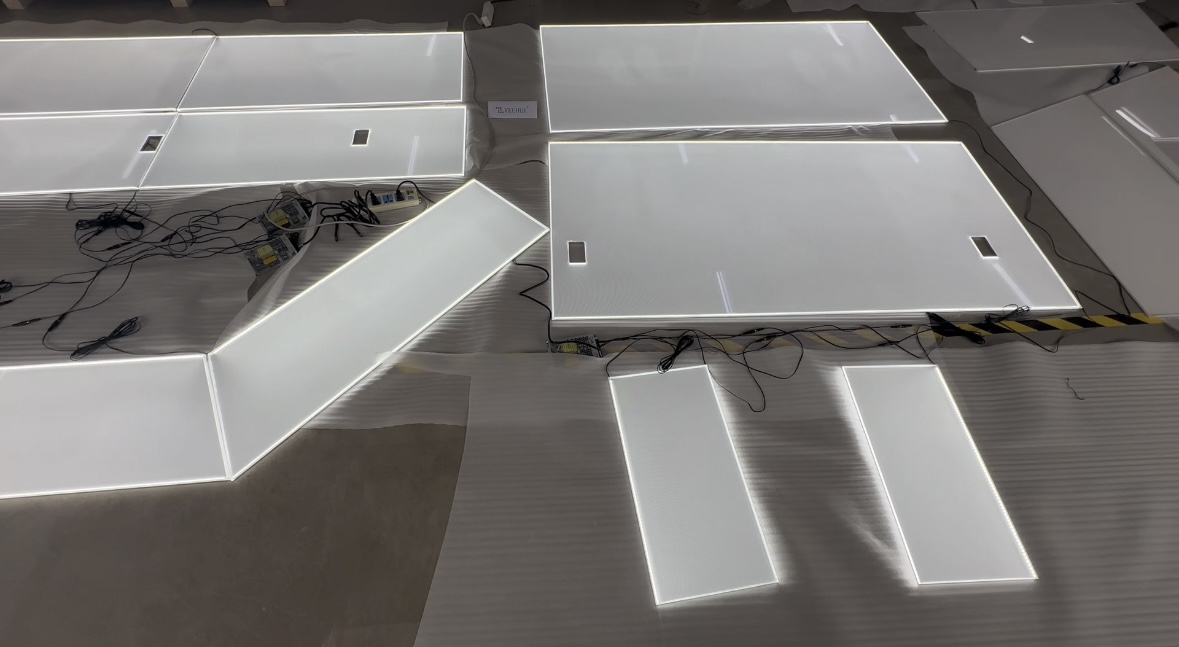Why a Thinner Light Panel Isn't Always Better
 Jan 14 , 2025 | Shanghai YIHUI Optoelectronic Technology Co., Ltd - Lighting Solution Provider
Jan 14 , 2025 | Shanghai YIHUI Optoelectronic Technology Co., Ltd - Lighting Solution Provider
In the world of lighting design, particularly for light panels, there is often a desire to make the panel as thin as possible. Clients may request a thinner product, thinking that it will be more aesthetically pleasing or functional. However, while thinness can have some advantages, there are important reasons why a thinner light panel isn't always the best solution. Below are some key points to consider when discussing the design and performance of light panels.
1. Light Distribution Quality
One of the primary functions of a light panel is to ensure uniform light distribution across its surface. Thinner panels often struggle to evenly distribute light, especially when using certain types of light sources like LEDs. A thicker panel allows for better light diffusion and a more consistent light output. When a panel is too thin, it can result in hotspots or uneven lighting, which can negatively impact the visual effect and functionality of the light.
2. Thermal Management
Another crucial consideration is heat dissipation. Light panels, particularly those using LEDs or other energy-dense light sources, generate heat during operation. Thinner panels have less surface area and fewer internal components designed for heat management, which can lead to overheating. Overheating can shorten the lifespan of the light panel, degrade the quality of light over time, and potentially cause safety issues. Thicker panels, on the other hand, offer more space for heat sinks or cooling mechanisms, ensuring longer-lasting and safer performance.
3. Durability and Longevity
A thinner light panel may be more susceptible to damage due to its reduced structural integrity. Thicker panels provide more material for reinforcement, making them less prone to warping, cracking, or breaking. For commercial applications or environments where durability is important, a thinner panel may not provide the longevity and reliability that thicker, more robust panels can offer.
4. Energy Efficiency and Brightness
In certain cases, a thinner light panel may require additional adjustments to maintain the same level of brightness as a thicker one. Achieving high levels of brightness in a thin panel might demand more power, potentially reducing the energy efficiency of the unit. Thicker panels can house more efficient light engines and power drivers, optimizing both brightness and energy consumption. This makes them a better option for applications where both high brightness and low energy consumption are key considerations.
5. Cost and Manufacturing Considerations
While it may seem that a thinner light panel would be less expensive due to less material being used, in many cases, achieving a high-performance thin panel involves more advanced manufacturing techniques or higher-quality materials, which can increase the overall cost. Additionally, designing a thin panel with optimal light distribution, heat dissipation, and durability can sometimes result in higher production costs. Thicker panels may allow for more straightforward design and manufacturing processes, offering a better balance between cost and performance.
While thinner light panels may seem like an attractive choice at first glance, they come with trade-offs that can compromise their overall performance. Key factors like light distribution, thermal management, durability, and energy efficiency all need to be considered. It's essential to understand that, in many cases, a slightly thicker light panel may be the better choice to ensure higher quality, longevity, and efficiency. Clients should focus on the specific requirements of their application and consult with experts to determine the best solution, rather than simply opting for the thinnest option available.
Ultimately, a balanced approach between thickness, performance, and cost is the key to achieving the best possible lighting solution.

